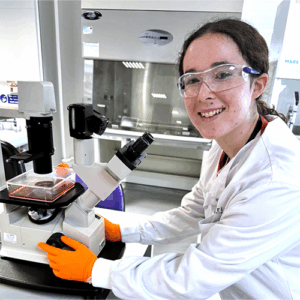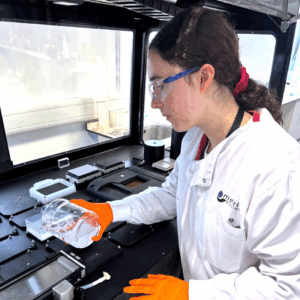 My placement year with Metrion has been brilliant! I have had the opportunity to gain real work experience within an contract research organisation, which has introduced me to a wide range of laboratory skills, such as aseptic cell culture techniques, molecular biology, manual and automated patch clamp electrophysiology. I’ve been able to develop my practical laboratory skills, whilst being taught the theoretical knowledge to add context to the experiments.
My placement year with Metrion has been brilliant! I have had the opportunity to gain real work experience within an contract research organisation, which has introduced me to a wide range of laboratory skills, such as aseptic cell culture techniques, molecular biology, manual and automated patch clamp electrophysiology. I’ve been able to develop my practical laboratory skills, whilst being taught the theoretical knowledge to add context to the experiments.
Metrion has taught me the necessity of generating and reporting high quality data, which has allowed me to contribute to projects. It is critical for drug discovery that accurate data are obtained by ensuring good current stability and checking passive parameters (seal resistance and Rseries) to prevent poor voltage clamp, which could alter the observed compound effect against ion channel targets. Having multiple repeats ensures that data are reliable and consistent and minimises any impacts of biological variance from cellular tools.
 I also had the great opportunity to generate two stably expressing monoclonal CHO- HCN cell lines, hHCN1 and hHCN2, which will be used by Metrion in the future. For my personal research project, I validated the CHO-hHCN2 cell line using the skills I have developed through the year. This involved plasmid design and transfection, dilution cloning and channel characterisation using manual patch clamp, before developing QPatch 48 and Qube 384 hHCN2 automated electrophysiology screening assays. This project gave me a deeper understanding of electrophysiology and ion channel function, as I learnt how to apply current literature to design and implement relevant assays to answer research questions.
I also had the great opportunity to generate two stably expressing monoclonal CHO- HCN cell lines, hHCN1 and hHCN2, which will be used by Metrion in the future. For my personal research project, I validated the CHO-hHCN2 cell line using the skills I have developed through the year. This involved plasmid design and transfection, dilution cloning and channel characterisation using manual patch clamp, before developing QPatch 48 and Qube 384 hHCN2 automated electrophysiology screening assays. This project gave me a deeper understanding of electrophysiology and ion channel function, as I learnt how to apply current literature to design and implement relevant assays to answer research questions.
Additionally, I greatly enhanced my science communication skills by compiling a written report, presenting the poster ‘Development of Automated Electrophysiology Assays for the Characterisation of Inhibitors Against Human HCN Ion Channels’ at the Cambridge Ion Channel Forum and delivering a presentation on the hHCN2 project I have completed.
I’d like to thank everyone at Metrion for the incredible support and mentoring I received throughout my placement, which has helped me grow both personally and professionally. Working at Metrion has further confirmed that I want to continue with laboratory work and research in the future. Everyone has been really welcoming and encouraging, and I’m returning to university with a greater amount of confidence conducting experiments independently and collaboratively in a laboratory setting.
 My placement year with Metrion has been brilliant! I have had the opportunity to gain real work experience within an contract research organisation, which has introduced me to a wide range of laboratory skills, such as aseptic cell culture techniques, molecular biology, manual and automated patch clamp electrophysiology. I’ve been able to develop my practical laboratory skills, whilst being taught the theoretical knowledge to add context to the experiments.
My placement year with Metrion has been brilliant! I have had the opportunity to gain real work experience within an contract research organisation, which has introduced me to a wide range of laboratory skills, such as aseptic cell culture techniques, molecular biology, manual and automated patch clamp electrophysiology. I’ve been able to develop my practical laboratory skills, whilst being taught the theoretical knowledge to add context to the experiments.
Metrion has taught me the necessity of generating and reporting high quality data, which has allowed me to contribute to projects. It is critical for drug discovery that accurate data are obtained by ensuring good current stability and checking passive parameters (seal resistance and Rseries) to prevent poor voltage clamp, which could alter the observed compound effect against ion channel targets. Having multiple repeats ensures that data are reliable and consistent and minimises any impacts of biological variance from cellular tools.
 I also had the great opportunity to generate two stably expressing monoclonal CHO- HCN cell lines, hHCN1 and hHCN2, which will be used by Metrion in the future. For my personal research project, I validated the CHO-hHCN2 cell line using the skills I have developed through the year. This involved plasmid design and transfection, dilution cloning and channel characterisation using manual patch clamp, before developing QPatch 48 and Qube 384 hHCN2 automated electrophysiology screening assays. This project gave me a deeper understanding of electrophysiology and ion channel function, as I learnt how to apply current literature to design and implement relevant assays to answer research questions.
I also had the great opportunity to generate two stably expressing monoclonal CHO- HCN cell lines, hHCN1 and hHCN2, which will be used by Metrion in the future. For my personal research project, I validated the CHO-hHCN2 cell line using the skills I have developed through the year. This involved plasmid design and transfection, dilution cloning and channel characterisation using manual patch clamp, before developing QPatch 48 and Qube 384 hHCN2 automated electrophysiology screening assays. This project gave me a deeper understanding of electrophysiology and ion channel function, as I learnt how to apply current literature to design and implement relevant assays to answer research questions.
Additionally, I greatly enhanced my science communication skills by compiling a written report, presenting the poster ‘Development of Automated Electrophysiology Assays for the Characterisation of Inhibitors Against Human HCN Ion Channels’ at the Cambridge Ion Channel Forum and delivering a presentation on the hHCN2 project I have completed.
I’d like to thank everyone at Metrion for the incredible support and mentoring I received throughout my placement, which has helped me grow both personally and professionally. Working at Metrion has further confirmed that I want to continue with laboratory work and research in the future. Everyone has been really welcoming and encouraging, and I’m returning to university with a greater amount of confidence conducting experiments independently and collaboratively in a laboratory setting.
 My placement year with Metrion has been brilliant! I have had the opportunity to gain real work experience within an contract research organisation, which has introduced me to a wide range of laboratory skills, such as aseptic cell culture techniques, molecular biology, manual and automated patch clamp electrophysiology. I’ve been able to develop my practical laboratory skills, whilst being taught the theoretical knowledge to add context to the experiments.
My placement year with Metrion has been brilliant! I have had the opportunity to gain real work experience within an contract research organisation, which has introduced me to a wide range of laboratory skills, such as aseptic cell culture techniques, molecular biology, manual and automated patch clamp electrophysiology. I’ve been able to develop my practical laboratory skills, whilst being taught the theoretical knowledge to add context to the experiments.
Metrion has taught me the necessity of generating and reporting high quality data, which has allowed me to contribute to projects. It is critical for drug discovery that accurate data are obtained by ensuring good current stability and checking passive parameters (seal resistance and Rseries) to prevent poor voltage clamp, which could alter the observed compound effect against ion channel targets. Having multiple repeats ensures that data are reliable and consistent and minimises any impacts of biological variance from cellular tools.
 I also had the great opportunity to generate two stably expressing monoclonal CHO- HCN cell lines, hHCN1 and hHCN2, which will be used by Metrion in the future. For my personal research project, I validated the CHO-hHCN2 cell line using the skills I have developed through the year. This involved plasmid design and transfection, dilution cloning and channel characterisation using manual patch clamp, before developing QPatch 48 and Qube 384 hHCN2 automated electrophysiology screening assays. This project gave me a deeper understanding of electrophysiology and ion channel function, as I learnt how to apply current literature to design and implement relevant assays to answer research questions.
I also had the great opportunity to generate two stably expressing monoclonal CHO- HCN cell lines, hHCN1 and hHCN2, which will be used by Metrion in the future. For my personal research project, I validated the CHO-hHCN2 cell line using the skills I have developed through the year. This involved plasmid design and transfection, dilution cloning and channel characterisation using manual patch clamp, before developing QPatch 48 and Qube 384 hHCN2 automated electrophysiology screening assays. This project gave me a deeper understanding of electrophysiology and ion channel function, as I learnt how to apply current literature to design and implement relevant assays to answer research questions.
Additionally, I greatly enhanced my science communication skills by compiling a written report, presenting the poster ‘Development of Automated Electrophysiology Assays for the Characterisation of Inhibitors Against Human HCN Ion Channels’ at the Cambridge Ion Channel Forum and delivering a presentation on the hHCN2 project I have completed.
I’d like to thank everyone at Metrion for the incredible support and mentoring I received throughout my placement, which has helped me grow both personally and professionally. Working at Metrion has further confirmed that I want to continue with laboratory work and research in the future. Everyone has been really welcoming and encouraging, and I’m returning to university with a greater amount of confidence conducting experiments independently and collaboratively in a laboratory setting.